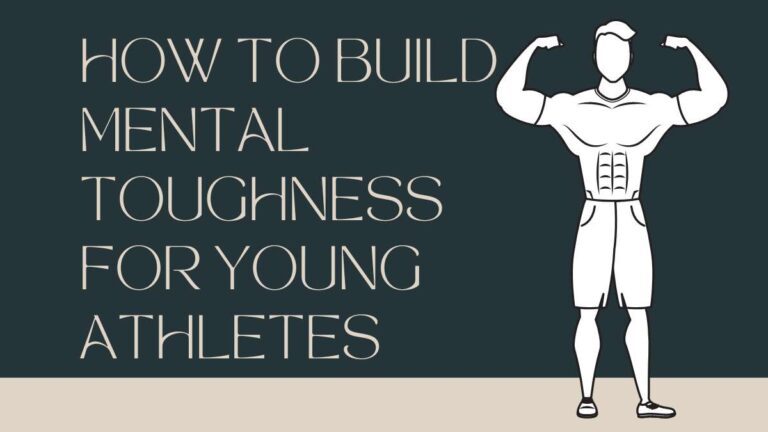5 Ways to Develop an Elite Athlete’s Mindset
Developing an elite athlete’s mindset is a crucial component of achieving peak performance in sports. While physical abilities and technical skills are undoubtedly important, it is the mindset that sets apart exceptional athletes from the rest. An athlete’s mindset encompasses their attitude, beliefs, and mental resilience, all of which significantly impact their performance on the field or court.
In this article, we will explore five effective ways to cultivate an elite athlete’s mindset. By adopting these strategies, athletes can unlock their full potential, overcome challenges, and achieve remarkable success in their chosen sport.
I. Set Clear and Specific Goals

Setting clear and specific goals is a foundational step in developing an elite athlete’s mindset. Without a clear target in mind, it’s difficult to gauge progress and stay motivated. By establishing specific and measurable goals, athletes create a roadmap for success. Whether it’s improving a personal record, mastering a specific skill, or winning a championship, clarity in goal-setting is crucial.
Clear goals provide focus and direction, allowing athletes to channel their efforts effectively. They serve as a source of motivation, driving athletes to push their limits and persevere through challenges. By breaking down long-term goals into smaller, attainable milestones, athletes can track their progress and celebrate achievements along the way.
Visualizing success and using affirmations can also enhance goal attainment. By vividly imagining themselves reaching their goals, athletes can create a mental blueprint of the desired outcome. Affirmations, positive statements that reinforce belief in one’s abilities, help athletes overcome self-doubt and maintain a positive mindset.
In summary, setting clear and specific goals provides athletes with a sense of purpose, direction, and motivation. It allows them to measure progress, overcome obstacles, and ultimately strive for excellence. By integrating visualization and affirmations into their goal-setting process, athletes can strengthen their mental focus and increase their chances of achieving their desired outcomes.
II. Embrace a Growth Mindset
Embracing a growth mindset is a powerful mindset shift that can propel athletes toward success. A growth mindset is a belief that abilities and skills can be developed through dedication, hard work, and a willingness to learn. It contrasts with a fixed mindset, which assumes that talents and abilities are fixed traits.
By adopting a growth mindset, athletes open themselves up to new possibilities and see setbacks as opportunities for growth. They view challenges as stepping stones to improvement rather than insurmountable obstacles. This mindset fosters a love for learning and a desire to continually develop skills and overcome limitations.
Cultivating a growth mindset involves reframing negative self-talk and replacing it with positive and empowering thoughts. Athletes learn to embrace constructive criticism and feedback as valuable tools for improvement. They also develop resilience in the face of setbacks, using them as learning experiences rather than allowing them to discourage or define them.
Self-reflection plays a crucial role in developing a growth mindset. Athletes take the time to assess their strengths, weaknesses, and areas for improvement. They set realistic goals that push their boundaries and seek out opportunities to acquire new knowledge or skills. By cultivating a growth mindset, athletes tap into their full potential and continually strive for excellence.
III. Cultivate Mental Resilience

Cultivating mental resilience is a vital aspect of developing an elite athlete’s mindset. Mental resilience refers to the ability to bounce back from setbacks, maintain focus under pressure, and stay determined in the face of challenges.
Athletes face numerous obstacles throughout their journey, including injuries, defeats, and external pressures. Building mental resilience equips them with the tools to handle these adversities and emerge stronger. It involves developing strategies to cope with stress, maintain composure, and recover quickly from setbacks.
One key strategy for cultivating mental resilience is embracing challenges. Athletes view challenges as opportunities for growth and development. By stepping out of their comfort zones and facing difficult situations, they build mental strength and gain confidence in their ability to overcome obstacles.
Another crucial aspect of mental resilience is maintaining focus under pressure. Athletes practice techniques such as mindfulness and meditation to enhance their ability to stay present and perform at their best, even in high-stress situations. These practices help them tune out distractions, manage anxiety, and maintain a clear and focused mind.
Developing coping mechanisms for setbacks and obstacles is also essential for mental resilience. Athletes learn to reframe failures as learning experiences and use them as stepping stones for improvement. They cultivate a positive mindset, seek support from coaches and teammates, and develop strategies to bounce back quickly from setbacks.
IV. Foster a Positive and Confident Attitude
Fostering a positive and confident attitude is a game-changer when it comes to developing an elite athlete’s mindset. A positive attitude not only enhances overall well-being but also significantly impacts performance on the field or court.
Athletes who maintain a positive outlook approach challenges with optimism and resilience. They believe in their abilities and focus on what they can control, rather than dwelling on negative circumstances. A positive attitude breeds motivation, determination, and a willingness to give their best effort in every situation.
Confidence is another key ingredient for athletic success. Athletes with a strong sense of self-belief perform at their peak, even in high-pressure situations. Building confidence involves recognizing and celebrating personal achievements, both big and small. By acknowledging their progress and skills, athletes boost their confidence levels and reinforce a positive mindset.
Positive self-talk plays a significant role in fostering a positive and confident attitude. Athletes consciously replace self-doubt and negative thoughts with affirmations and encouraging statements. They cultivate a supportive inner dialogue that bolsters their confidence and self-belief.
Creating a positive and supportive environment is also crucial. Athletes surround themselves with coaches, teammates, and mentors who uplift and inspire them. This network of support fosters a sense of belonging, motivation, and camaraderie, further fueling their positive attitude and confidence.
V. Maintain Consistency and Discipline
Maintaining consistency and discipline is a fundamental aspect of developing an elite athlete’s mindset. It is the unwavering commitment to training, preparation, and self-improvement that sets apart extraordinary athletes from the rest.
Consistency is about establishing a regular and structured routine. Athletes adhere to a consistent training schedule, ensuring they dedicate sufficient time and effort to their sport. Regular practice not only builds physical skills but also reinforces mental habits and strengthens the athlete’s mindset.
Discipline goes hand in hand with consistency, as it requires athletes to stay focused and dedicated to their goals. It involves making sacrifices and prioritizing training and preparation over distractions or short-term gratification. Athletes with discipline demonstrate self-control, perseverance, and the ability to stay on track even when faced with challenges or temptations.
Establishing and maintaining healthy habits is crucial for consistency and discipline. Athletes prioritize proper nutrition, rest, and recovery to optimize their performance. They understand the importance of balancing physical exertion with adequate rest to prevent burnout and maintain long-term sustainability.
Motivation can fluctuate, so athletes rely on discipline to stay committed to their training regimen. They create systems of accountability, such as training partners, coaches, or goal-tracking methods, to ensure they stay on track. By holding themselves accountable and staying disciplined, athletes maximize their potential for growth and improvement.
Conclusion
Developing an elite athlete’s mindset requires dedication, self-reflection, and a commitment to continuous growth. It is a holistic approach that encompasses both the mental and physical aspects of athletic performance. By adopting these strategies, athletes can navigate challenges, overcome setbacks, and develop the mental fortitude necessary to excel in their athletic endeavors.
Remember, the journey to an elite athlete’s mindset is ongoing. It requires consistent practice, self-belief, and a willingness to push beyond perceived limits. Embrace the power of your mindset, cultivate a positive and determined attitude, and stay committed to your goals. With an elite athlete’s mindset, you can unlock your true potential and reach new heights in your athletic journey.



